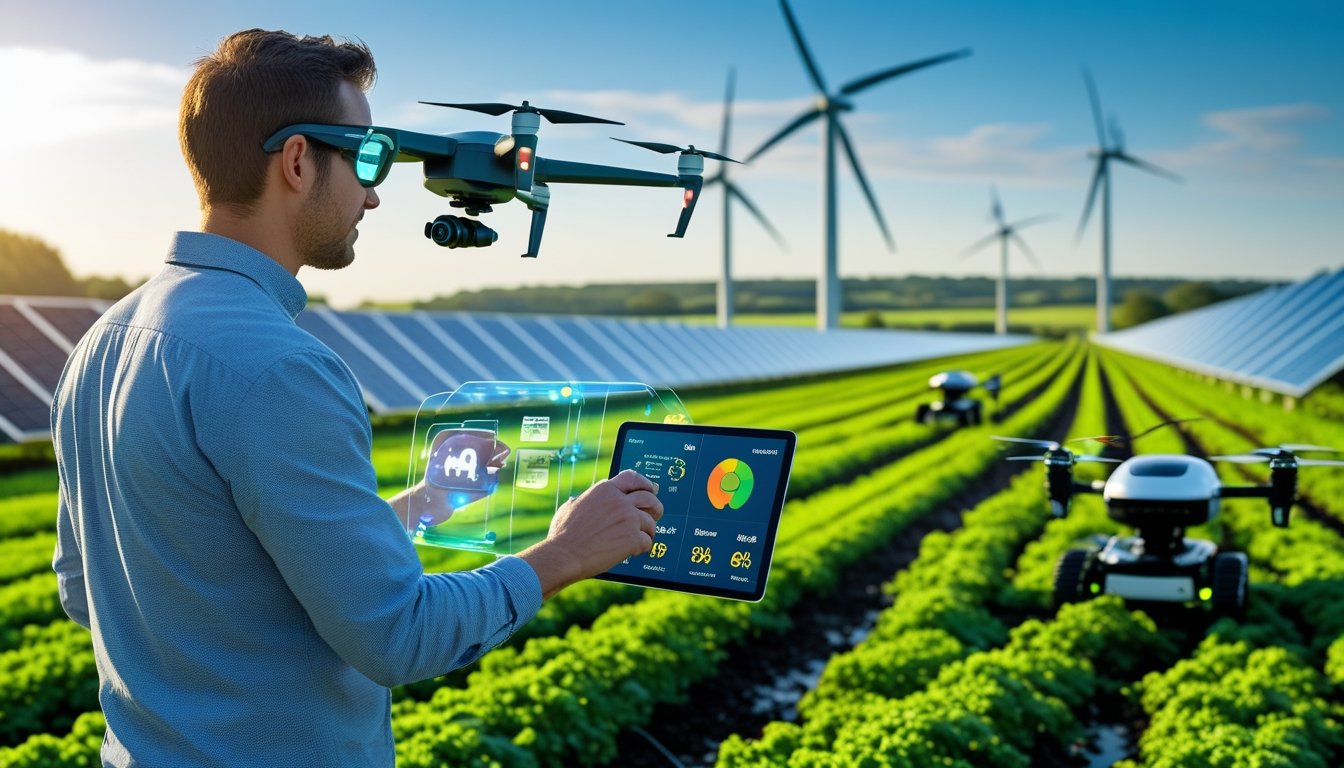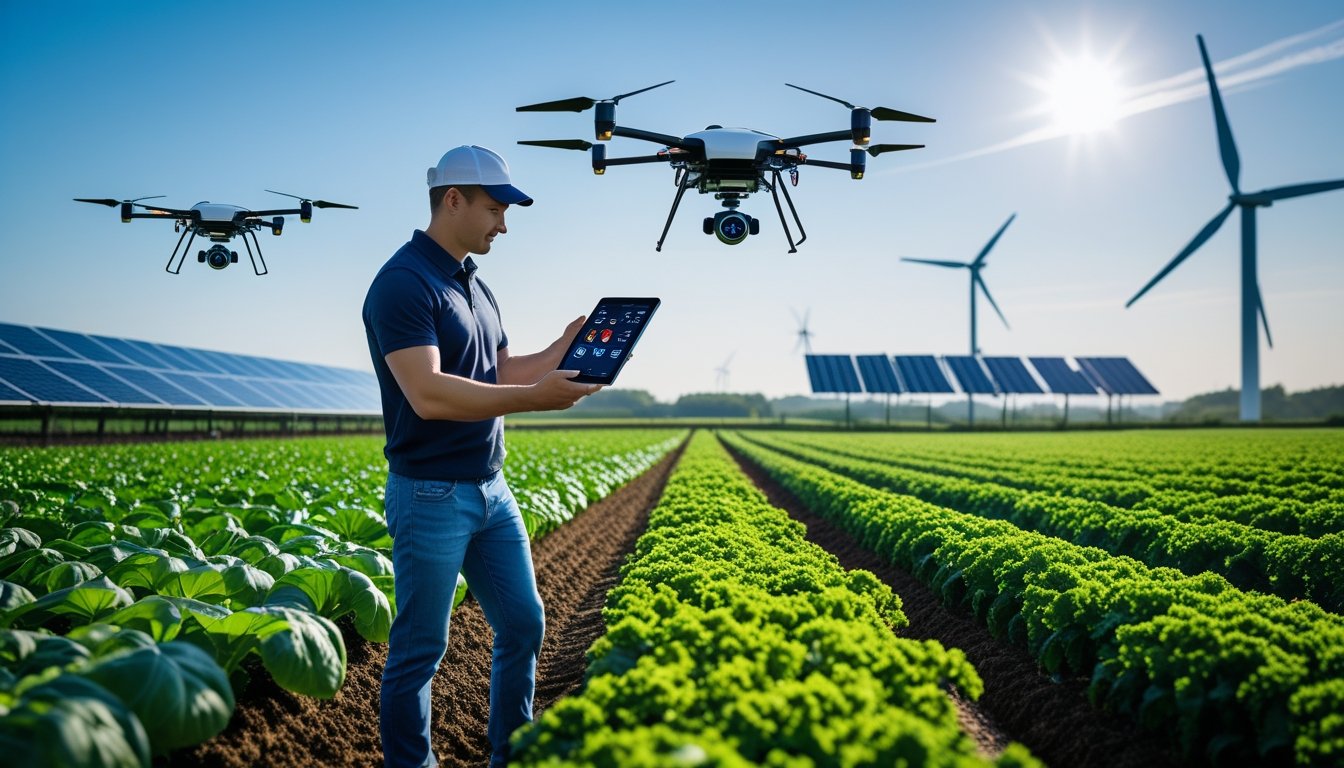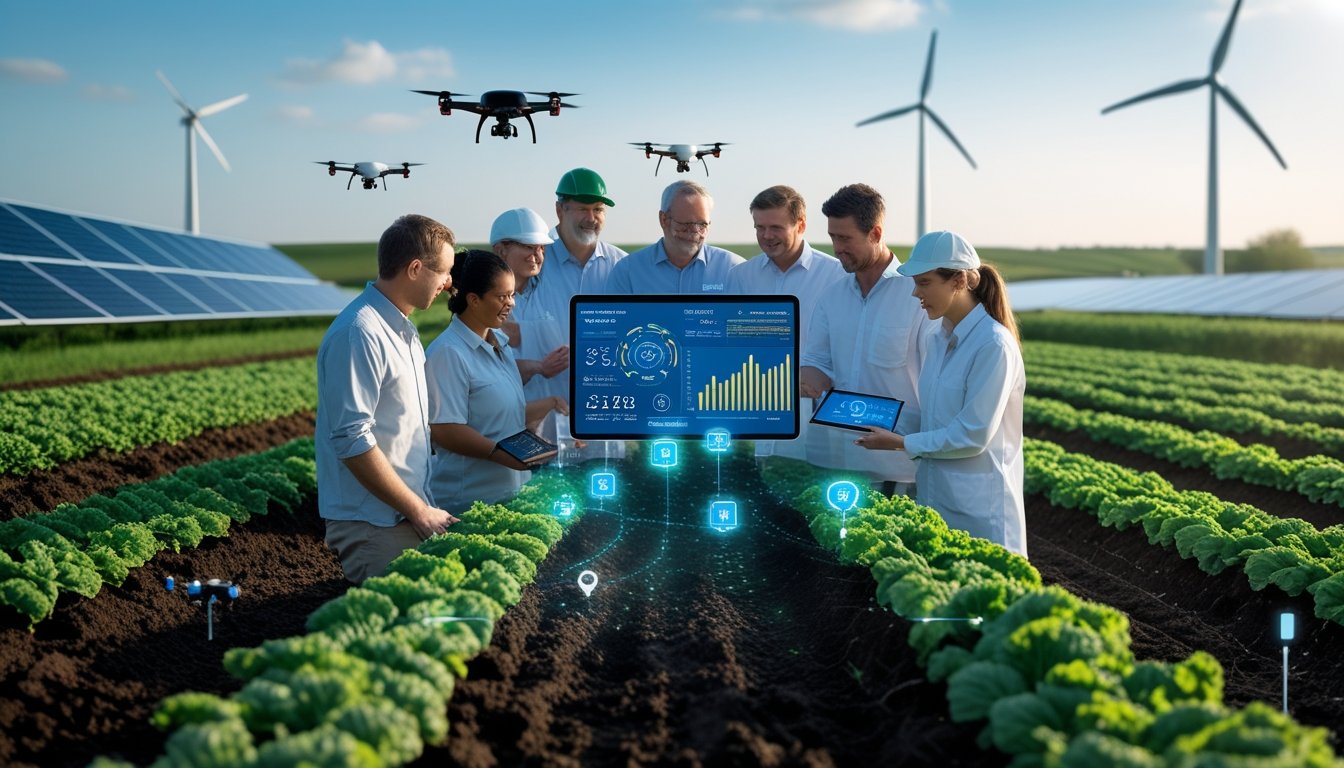Late updated: 01 Sep 2025 11:09
Written by: Oliver Bennett
AI Advancements In UK's Renewable Farming Practices: Boosting Sustainability and Innovation
Artificial Intelligence (AI) is not only advancing technology but also transforming traditional sectors like agriculture. In the UK, we're witnessing a remarkable shift in farming practices towards renewable and sustainable methods with AI at the forefront. From predictive algorithms for crop management to AI-powered machinery enhancing efficiency, these advancements are not just technical achievements; they represent a fundamental change in how we approach agriculture. This blending of intelligent tech with age-old farming promises a more resilient agricultural future, tackling pressing issues such as climate change and food security.

As AI reshapes British agriculture, we're seeing initiatives designed to maximise yield while minimising environmental impacts. Smart farming tools like drones and IoT devices enable precise monitoring and management of crops, contributing to optimised resource usage and reduced waste. British farmers are now equipped with the technology to ensure that their methods are both innovative and sustainable, marrying tradition with future-forward solutions.
Our exploration of AI in renewable farming opens up discussions around the ethical and practical implications of these technologies. It's crucial to consider how AI can aid in contributing to a sustainable and secure food supply chain while addressing climate change challenges. By delving into these topics, we can better understand the potential AI holds for revolutionising agriculture not only in the UK but globally.
Key Takeaways
- AI is revolutionising UK's farming with efficiency and sustainability.
- Smart technologies enhance resource use and crop management.
- Ethical and practical implications of AI need consideration.
AI Technologies Shaping the UK's Renewable Farming Practices
Our exploration into AI technologies reveals critical innovations in the UK's renewable farming sector. This includes the precision of automation, the smart monitoring of crops, advancements in livestock management, and the utilisation of digital twins and autonomous machinery.
Precision Farming and Automation
Precision farming and automation have radically transformed agricultural practices by reducing waste and enhancing crop yield. AI-enabled precision farming allows us to apply resources like water and fertiliser with pinpoint accuracy. Machine learning algorithms analyse vast datasets, including soil conditions and weather patterns, to automate planting and irrigation schedules efficiently.
Operations benefit from automated machinery, which not only addresses labour shortages but also supports sustainable practices through reduced resource consumption. Autonomous tractors equipped with GPS and sensory technology help in the precise tilling and planting of seeds, minimising soil disruption.
Smart Crop Management and Monitoring
AI advancements have greatly improved crop management by providing real-time monitoring systems. Our smart farming techniques employ IoT devices and drones to gather data on crop health, soil quality, and growth rates. These systems identify diseases and nutrient deficiencies early, allowing for targeted interventions.
With AI's assistance, we can optimise crop yield through selective harvesting techniques informed by sensor data. Machine learning models predict the best harvesting windows, improving both quality and quantity. This data-driven approach enables farmers to adapt quickly to changes, thereby maintaining sustainability.
Livestock Management and Animal Welfare
In livestock management, AI technologies ensure animal welfare is at the forefront. Sensors and AI algorithms monitor animal behaviour, health, and productivity. These tools help in detecting illnesses early, which in turn reduces treatment costs and prevents disease spread.
Smart collar systems provide insights into livestock location, reducing losses and enhancing management efficiency. With AI's analytical capabilities, farmers can optimise feeding patterns and breeding processes, leading to healthier herds and increased output.
Digital Twins, Robotics, and Autonomous Machinery
Digital twins and robotics play pivotal roles in modernising our agricultural landscape. Digital twins, virtual replicas of farm environments, allow us to simulate and analyse farming operations without physical risks. This facilitates better decision-making regarding farm management strategies.
Robotics and autonomous machinery further support our operations by performing repetitive tasks like planting and weeding. This reduces human labour and increases efficiency. These machines are equipped with sensors and cameras, using AI to navigate fields and complete tasks autonomously.
Incorporating these cutting-edge technologies accelerates the transformation of UK agriculture into a more resilient and sustainable practice, poised to meet the growing demands of food security.
Sustainability, Food Security, and Ethical Considerations in AI-Driven UK Farming

In this section, we explore how AI can support sustainable farming practices in the UK, addressing climate change and ensuring resource efficiency. Our focus is on how AI integrates with existing systems to enhance environmental sustainability and food security while considering ethical challenges.
Advancing Sustainable Agricultural Practices
AI is transforming sustainable agricultural practices by enabling precise monitoring of crop health and soil conditions. Using advanced sensors and machine learning algorithms, we can target interventions such as fertilisation and pest control, reducing chemical usage and waste. This precision farming not only enhances yield but also minimises the ecological footprint.
In the UK, integrating AI with traditional knowledge supports biodiversity. By using AI to identify optimal planting patterns and crop rotation, farmers can maintain soil fertility. AI also plays a role in optimising water usage, ensuring that resources are used efficiently. This is crucial for fostering a resilient agricultural ecosystem.
Addressing Climate Change and Environmental Impact
Addressing climate change within farming is critical. AI offers tools to monitor and predict climate patterns, assisting farmers in adapting to changing conditions. Predictive analytics allow for better decision-making, from choosing drought-resistant crops to timing planting seasons. This forward-thinking approach is essential for mitigating adverse effects of climate change.
AI-driven practices help in reducing the environmental impact of agriculture. For instance, automated systems can efficiently manage livestock waste, reducing greenhouse gas emissions. Through AI, farms can assess their carbon footprint and implement strategies to reduce it. Such advancements aid in creating a sustainable farming future in the UK.
Strengthening Food Security and Resource Efficiency
Ensuring food security is a pressing issue, and AI is pivotal in strengthening it. By enhancing resource efficiency, AI reduces the risks of supply chain disruptions. Smart analytics can identify bottlenecks early, allowing us to address them swiftly and ensure continuous food supply.
AI also facilitates the development of alternative protein sources, contributing to food security. Innovations in sustainable food production help cater to a growing population without depleting resources. Ethical considerations, such as fair data practices and transparency in AI decision-making, are crucial in maintaining trust and integrity in AI-driven farming. These elements are vital for a sustainable and secure food system.
Frequently Asked Questions

Artificial intelligence is transforming renewable farming in the UK by enhancing predictive analysis, optimising energy use, and improving crop yields. AI integration with renewable energy and waste reduction also plays a crucial role.
How are artificial intelligence systems augmenting predictive analysis in renewable farming in the United Kingdom?
AI systems empower us with tools like predictive algorithms that analyse weather patterns and soil conditions, helping farmers make informed decisions. By forecasting conditions accurately, we can adapt our farming practices proactively, ensuring better crop management and resource allocation.
What role does AI play in optimising energy consumption for sustainable agriculture across the UK?
AI significantly contributes to the optimisation of energy usage through smart grid integration and automated systems. These technologies allow us to manage and distribute energy resources efficiently, thus reducing energy waste and lowering costs in various farming operations.
In what ways have machine learning techniques been applied to improve crop yield and soil health in British farming?
Machine learning techniques enable precision agriculture by analysing vast datasets to offer insights on crop health, growth patterns, and soil nutrients. Our ability to apply precise amounts of fertilisers and predict pest invasions boosts crop yields while maintaining soil integrity.
How is AI being incorporated into the management of renewable energy resources within the agriculture sector of the UK?
By integrating AI with renewable energy systems like solar panels and wind turbines, we manage energy production to meet farming needs effectively. AI controls optimise energy storage and usage, ensuring continuous operation of agricultural equipment without excessive reliance on non-renewable sources.
Can you detail the impact of AI on the reduction of waste and enhancement of efficiency in the UK's renewable farming practices?
AI-driven technologies streamline farming operations by reducing waste through precise application of resources and automation. Efficient farming techniques result from AI’s ability to identify optimal resource use, contributing to sustainable practices and improved farming efficiency.
What advancements have been made in the integration of AI with greenhouse management to bolster renewable farming in the UK?
AI advancements in greenhouse management include automated climate controls, lighting, and irrigation systems. These technologies create optimal conditions for plant growth, enhancing productivity and resource efficiency. Consequently, we achieve higher yield outputs while reducing the environmental footprint of greenhouse farming.
